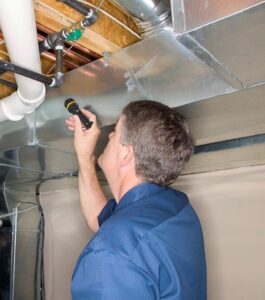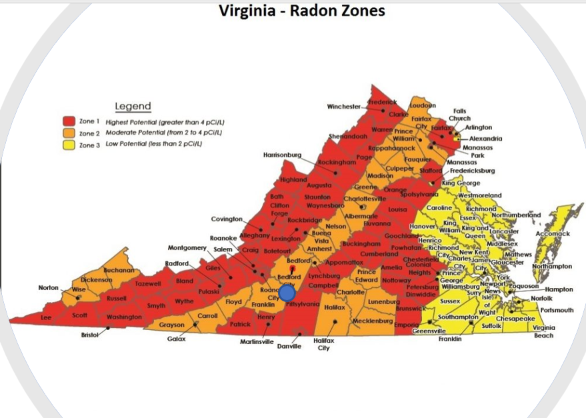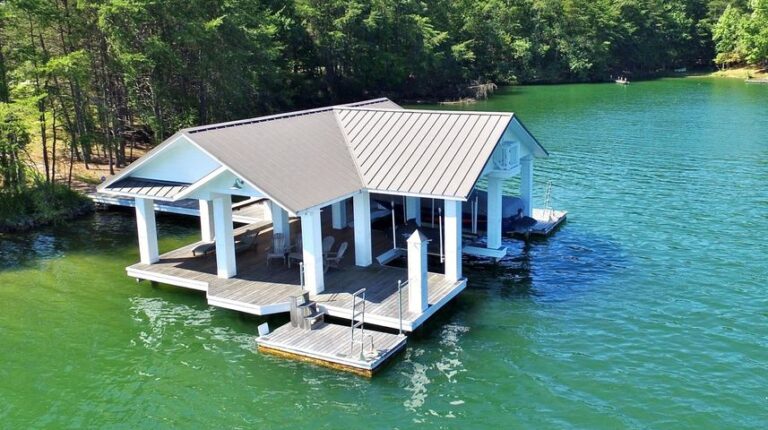Why Complete an Inspection?
Purchasing your Smith Mountain Lake Property will likely be one of the largest personal investments you will ever make. Getting a detailed home inspection prior to closing by a certified professional inspector is an inexpensive way to discover the universal condition of a lake home. Your inspection will enable you to avoid purchasing a property in need of significant repairs and save you from unexpected hidden repair costs. We do not recommend using an inspector suggested by the seller or seller’s agent. A home inspection typically costs between $350 and $600 depending on the size of the home and the inspection service options. Your inspection can potentially reveal thousands of dollars in repairs that should be considered prior to closing and can go as far as revealing a property that should be avoided all together. The inspections that you plan to conduct, must be specified within your purchase contract.

What Types of Inspections Should Be considered?
- Home Inspection: During the inspection, the property is examined top to bottom, with emphasis placed on evaluating the condition of the roof, walls, foundation, plumbing system, electrical system, and HVAC system. Inspectors will also check for proper operation of installed systems, such as garbage disposals and carbon smoke detectors, as well as for leaks, mold, mildew, and other signs of water damage.
- Radon Inspection: As depicted in the Virginia Radon diagram, Smith Mountain lake is in an area where there is a moderate chance that the radon levels measured inside of a home are above the EPA recommended limit of 4.0 pCi/L. Your home inspector should have the required equipment to measure radon levels and this should be considered if there is below ground living area or if the main level of the home is built on a slab. In the event that the level is above the limit, there are numerous companies that can install a system to remediate the level typically for under $1,500.
- Termite Inspection: Termite control and treatment is an important part of owning a home at SML. Eastern termites do exist in the area and an inspection is a required part of the purchase process in instances where a mortgage will be used for financing. Termite inspections are typically a seller paid for inspection and completed by a licensed pest control company.

- Septic Inspection: There is a range of options for inspecting a septic system. Most often a seller paid for inspection, I recommend to buyers that they elect to hire and fund this inspection on their own, especially if the system is older. Doing so, will provide an opportunity to conduct a more in depth inspection, including using a camera to inspect the septic tank and field using a specialized camera. if the property is located in Franklin County, the septic tank must be pumped out every 5 years. As a seller, you will need to provide a pump out receipt to the purchaser showing completion within the last 5 years.
- Water Quality/Well Inspection: If the property that you are purchasing is supplied by a private well, a water quality test is advisable to ensure that coliform and E. Coli are not present. Most often a seller funded inspection, contaminants are found to be present, the situation can typically be addressed by “shocking” the well, ie. treating it. If the water pressure is suspect, it may be advisable to have the well flow rate measured. Well water tends to be hard in the area, as such a softener may be helpful. Some wells require filter systems.
Special Inspection Considerations for Lakefront

There are two unique inspections that apply to waterfront land and docks at SML.
- Dock Structure/Mechanical Inspection: A dock structure/mechanical inspection can either completed by your home inspector or by a licensed dock builder. A well built and maintained dock with wooden pilings can last as long as 50 years, however many factors can shorten the life. The dock structure, electrical systems, and lift mechanical should be inspected for safe and proper operation. Cables that lift boats out of the water should be replaced when they begin to show any sign of fraying or if rust is present. I change mine every 7 to 10 years.
- Power Company Dock/Shoreline Compliance Inspection: When a waterfront property is transferred from seller to purchaser, it is important to understand the status of the dock and shoreline as it relates to the power company, AEP. AEP’s license to operate the Smith Mountain Project requires that it maintain a Shoreline Management Plan. The plan contains comprehensive rules and specifications surrounding what each owner can and cannot do with respect to their dock and shoreline. Most docks have are assigned an Occupancy and Use permit by AEP and that permit is transferred from seller to purchaser at closing. Docks that do not have a Occupancy and Use Permit, may have been constructed prior to the shoreline plan being established in August of 2003. These docks may not meet the current requirements of the shoreline management plan, but instead be classified as Pre Existing Non Conforming docks. AEP offers a free inspection prior to closing where they will visit the property and report the status of the dock and shoreline back to the owner. This ensures that the dock and shoreline are acceptable to AEP and as such, the new owner is not unknowingly taking on any liabilities related to the dock or shoreline. This is a critical part of the sales process for waterfront homes and lots at SML. Ensuring that you are working with an agent that is highly experienced with regard to docks, shoreline, and the SMP, is critical in protecting your interests.
What to look for in an inspector
Front Door recommends selecting a general home inspector that:
- Is ASHI (American Society of Home Inspectors) certified.
- Is licensed in the state of Virginia.
- Previously had experience working in construction or as a general contractor.
- Is hired by you and NOT the seller or seller’s agent. This ensures the inspector is dedicated to your interests.
- Carries E&O (Error & Omissions) insurance.
- Provides a detailed report including photographs and clearly delineates between defects that need to be corrected vs. cosmetic items. if unfamiliar with the inspector, you may want to request that the inspector send you a sample report.
- Is local and has experience particularly with lakefront homes at SML.
Requesting Repairs
Assuming you are using a local realtor that uses the RVAR sales contract, the contract usually specifies a dollar amount called the remediation amount, which specifies the amount below which, the seller is obligated to make repairs before closing. The seller is only obligated to address structural defects and repairs to major systems, such as plumbing and electrical, and built-in appliances. There can be grey areas in terms of what is and is not a required repair verses a cosmetic issue. Your real estate agent should be skilled in helping you navigate grey areas toward negotiating a fair resolution with the seller. If the estimate obtained by the purchaser is above the remediation dollar amount, then the seller has the option of a.) completing the repairs OR b.) they may offer a dollar amount in lieu of completing repairs OR c.) they may refuse to make repairs. If they choose b.) or c.), then you may opt out of the contract. All repairs must be completed by contractors licensed in the State of Virginia.